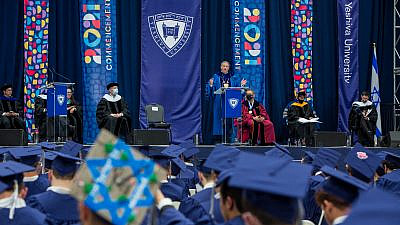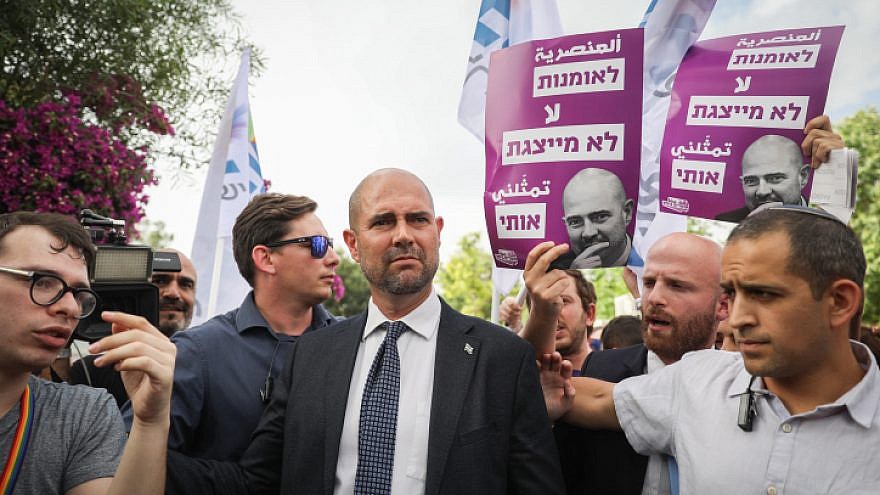Just hours before the start of Shabbat, on Sept. 16, Yeshiva University sent a message to its student body announcing the cancellation of school clubs as it deals with the aftermath of a U.S. Supreme Court order in its ongoing court battle with an LGBTQ student group.
“Considering the upcoming chagim, the university will hold off on all club activities while it takes immediate steps to follow the roadmap provided by the U.S. Supreme Court to protect YU’s religious freedom,” the school said in an email to students.
The chagim include not only the High Holidays, but also Sukkot and Simchat Torah, and do not conclude until mid-October.
YU’s move came two days after the Supreme Court issued an order denying the university’s request for a stay of a lower court ruling in a case that puts the university at odds with LGBTQ students who want to create a school-supported club on campus.
In issuing its 5-4 decision on Yeshiva University v. YU Pride Alliance, a temporary stay that had been granted to the university on Sept. 9 by Justice Sonia Sotomayor was lifted.
At the heart of this case is whether Yeshiva University must support an LGBTQ club on campus as it does other groups. Supporters of the YU Pride Alliance say that to deny them the same rights as other clubs violates the New York City Human Rights Law as the school is a “place or provider of public accommodation” and must therefore provide the proposed club equal status despite members’ sexual orientation.
However, the university claims that as a “religious corporation” they are not bound by the Human Rights Law and do have to fund a club that is inconsistent with the school’s values.
In its decision on Sept. 14, the Supreme Court declined to issue a stay because “it appears that applicants [Yeshiva University] have at least two further avenues for expedited or interim state court relief.”
According to a spokesperson for the school, it is already pursuing those avenues. “Our lawyers submitted the briefs on Friday as directed by the U.S. Supreme Court. We anticipate a quick conclusion in the courts and the start of clubs soon.”
The YU student newspaper The Commentator said that 130 groups had applied for club status at the school this year.
The Supreme Court’s order removing the stay was issued “without prejudice,” which allows YU to go back to New York state courts for relief while maintaining the right to appeal to the U.S. Supreme Court at a later date if necessary. Voting to lift the stay were Chief Justice John Roberts and Justices Sonia Sotomayor, Elena Kagan, Brett Kavanaugh and Ketanji Brown Jackson.
Writing for the minority, which included Justices Clarence Thomas, Neil Gorsuch and Amy Coney Barrett, Justice Samuel Alito asked, “Does the First Amendment permit a state to force a Jewish school to instruct its students in accordance with an interpretation of Torah that the school, after careful study, has concluded is incorrect? The answer to that question is surely ‘no.’
“The First Amendment guarantees the right to the free exercise of religion, and if that provision means anything, it prohibits a State from enforcing its own preferred interpretation of Holy Scripture. Yet that is exactly what New York has done in this case, and it is disappointing that a majority of this Court refuses to provide relief,” the dissent said.
Katie Rosenfeld, an attorney who represents the YU Pride Alliance, told JNS, “This Supreme Court decision is a victory for Yeshiva University students who are simply seeking basic rights that are uncontested at peer universities.
“We are confident that we will continue to overcome the administration’s aggressive litigation strategies against its own LGBTQ+ students, who choose to attend Yeshiva University because they are committed to the school’s mission,” she said. “At the end of the day, Yeshiva University students will have a club for peer support this year, and the sky is not going to fall down. No longer will students be denied a safe and supportive space on campus to be together.”

In a statement issued last week, YU President Rabbi Ari Berman said, “Every faith-based university in the country has the right to work with its students, including its LGBTQ students, to establish the clubs, places and spaces that fit within its faith tradition. Yeshiva University simply seeks that same right of self-determination.
“The Supreme Court has laid out the roadmap for us to find expedited relief and we will follow their instructions,” he added. “At the same time, as our commitment to and love for our LGBTQ students are unshakeable, we continue to extend our hand in invitation to work together to create a more inclusive campus life consistent with our Torah values.”
However, not everyone agrees with Berman’s assertion that the administration has extended its hand “to work together to create a more inclusive campus life.”
A letter signed by more than 800 alumni of the school called out the administration for its attitude, saying they are “distressed” to see “Torah values deployed to deny fellow Jews safety and support within our community” and “saddened and disheartened by the positions our Yeshiva University has recently taken.”
Noting the rabbinic commandment of kol yisrael areivim zeh bazeh, all Jewish people are responsible for one another, the letter states, “As family members, friends, rabbis, and members of the Jewish community, the bare minimum of our responsibility is making sure LGBTQ+ Jews feel safe and welcome. This responsibility does not require any changes to Halakha [Jewish Law], nor any impingement on Torah values.”
If the school continues to alienate these students, the letter continued, “… most gravely, we fear that LGBTQ+ Jews will come to believe that their only choices are to suffer in silence, or leave our communities altogether.”


























